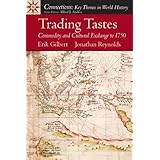Read Ebooks Trading Tastes Commodity And Cultural Exchange To 1750
Will reading habit influence your life? Many say yes. Reading trading tastes commodity and cultural exchange to 1750 is a good habit; you can develop this habit to be such interesting way. Yeah, reading habit will not only make you have any favourite activity. It will be one of guidance of your life. When reading has become a habit, you will not make it as disturbing activities or as boring activity. You can gain many benefits and importances of reading.
When coming with trading tastes commodity and cultural exchange to 1750, we feel really sure that this book can be a good material to read. Reading will be so enjoyable when you like the book. The topic and how the book is presented will influence how someone loves reading more and more. This book has that component to make many people fall in love. Even you have few minutes to spend every day to read, you can really take it as advantages.
Compared with other people, when someone always tries to set aside the time for reading, it will give finest. The result of you read trading tastes commodity and cultural exchange to 1750 today will influence the day thought and future thoughts. It means that whatever gained from reading book will be long last time investment. You may not need to get experience in real condition that will spend more money, but you can take the way of reading. You can also find the real thing by reading book.
Delivering good book for the readers is kind of pleasure for us. This is why, the trading tastes commodity and cultural exchange to 1750 books that we presented always the books with incredible reasons. You can take it in the type of soft file. So, you can read trading tastes commodity and cultural exchange to 1750 easily from some device to maximize the technology usage. When you have decided to make this book as one of referred book, you can give some finest for not only your life but also your people around.
Bulletin Kenton County Historical Society
and author of trading tastes commodity and cultural exchange to 1750 2006 will give a presentation titled crossing the borders of african and world history . the program will be held in the science lecture hall at thomas more college. friday march 16 2007 700pm sunday march 11 2007 200pm
Semester At Sea Course Syllabus
day 23 columbian exchange how much have things changed reading gilbert erik chapter 5 making connections how much have things changed in trading tastes commodity and cultural exchange to 1750 pp. 140 151. final paper due december 3rd
University Of North Carolina At Greensboro Jamie Andersonuncg
cultural self identity. some of the secondary topics we will explore include the fluid border less and cultural exchange on the silk roads. explorations in world history. boston mcgraw hill 2007. isbn 9780072843514. 2. gilbert erik and jonathan t. reynolds. trading tastes commodity and culture exchange to 1750. upper saddle river n
The Currency That Is Accepted In Ports Locating South ...
gabaccia conceives of the atlantic as a geographical conceit and as a watery site of cross cultural exchange and struggle. 2 see for example k. n. chaudhuri trade and civilisation in the indian ocean an economic history from the rise of islam to 1750 cambridge cambridge university press 1985 idem asia
Producing In Europe And Asia 1750 1850
1750 1850 lissa roberts university of twente abstract this essay argues for understanding and investigating the history of produc tion not primarily as a quantiable economic phenomenon but as a history of practice that involves the human senses culture governance and material engage ment.
Markets Demand And The Evolution Of The European Fashion ...
framed the cultural stimulus to demand and focused the desire for self definition it directed as well collective material affirmations among communities defined by age social rank religion ethnicity or other cultural attributes. 4. chaudhuri trade as a cultural phenomenon p. 210.
Intra European Trade In Atlantic Africa And The African ...
or with bills of exchange the way they purchased commodities in other venues in africa they bargained with one another with goods for goods in much the same manner as they traded with african merchants. in the african atlantic european slavers adopted a mechanism of cross cultural trade even when trading with one another.13

